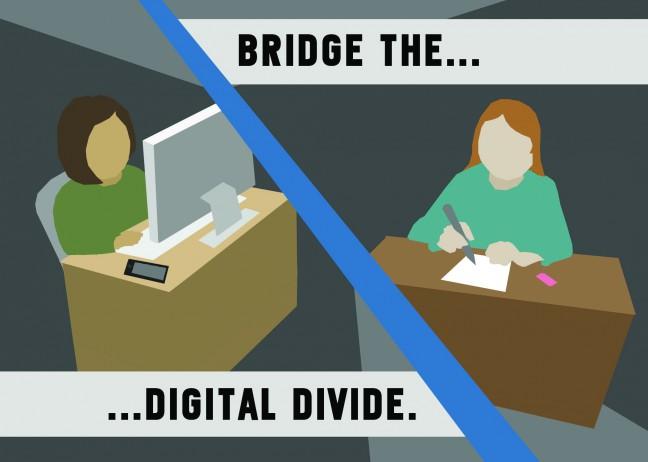As the city begins to deliver internet service to lower-income households, it remains unclear if residents have the devices they need to go online.
Last year, the city government decided to contract with ResTech Services to bring internet access to several low-income neighborhoods, but this was just the first step in bridging the so-called “digital divide” in Madison. The city now looks to study device ownership in these communities and develop plans to provide them for households without devices.
Among those benefiting from the city program are the Darbo-Worthington and Kennedy Heights neighborhoods on the north side of Madison.
The focus on providing connectivity to low-income residents is rooted in 2014 census data which showed 12 percent of residents did not have internet access. Advocacy groups have said alleviating the problem will require tackling three underlying deficiencies: internet access, device access and digital literacy.
City hopes to bridge digital divide with help of Madison company
Now, three months after the city announced its partnership with ResTech, Ald. Mark Clear, District 19 and Digital Technology Committee member, said the contract between the two entities has been finalized. As fiber optic cable connections are being installed, Clear said the city must now determine who can and cannot use their internet — but this has proven to be a hard decision to make, due to a lack of information.
“One of the challenges is poor information, and the information we have is pretty anecdotal,” Clear said.
The only other data informing city efforts is a school district survey that only asked whether there was a device available in the home of the student, Clear said. The study did not provide crucial details such as the sophistication of the device, but Clear said it’s likely most low-income households do not have devices, based on conversations with landlords.
To remedy this lack of information, Clear said a subcommittee within the Digital Technology Committee is in the early stages of planning a city-funded survey to inform future initiatives. Such a survey would include questions about the number and kind of devices in low-income households.
Despite a lack of clear statistical evidence, neighborhoods covered by the new internet access are already moving to address a perceived lack of devices. In addition to working with the city, neighborhoods are hoping for private partners to provide devices, while what form these devices will take is undecided.
Kennedy Heights Community Center executive director Claude Gilmore said the community needs help providing two key resources: education and devices.
“We’re looking for partners to provide devices so they can experience the full breadth and scope of technology,” Gilmore said.
With new digital connectivity Madison residents need devices, literacy
As an advocate and representative for the community, Gilmore believes a lack of devices is the biggest obstacle for most people wishing to access the internet. He said he is hopeful technology companies will be willing to provide devices as a way to reach more consumers and better their image as a company.
More than just helping low-income people, Gilmore believes diversity in age and race among community members receiving devices will further entice companies to donate devices.
“They can get the parents and get the kids,” Gilmore said.
While progress will soon be seen in his neighborhood as well as others, Gilmore said it’s vital the city continues addressing all aspects of the problem of disparities in digital access.
Without continued attention, Gilmore said the city could run the risk of having households that have devices, but don’t know how to use them or vice-versa.
“This is important, we’ve got to keep the fire burning on this one,” Gilmore said.

















